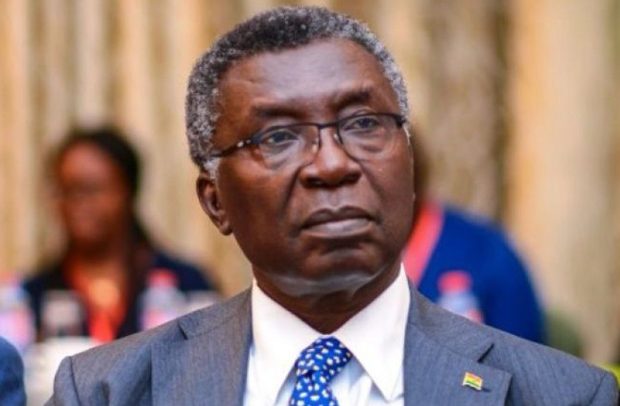Prof. Frimpong-Boateng
The Office of the President has branded former Environment, Science, Technology, and Innovation Minister Kwabena Frimpong-Boateng’s report, which accuses some government officials of malfeasance in the fight against illegal mining, popularly known as galamsey, as a compilation of personal grievances.
The presidency stated that the document publicised in the media and being discussed was not an official report properly presented to the President’s Office by the Chairperson of the former Inter-Ministerial Committee on Illegal Mining (IMCIM).
In a statement issued last Friday, the presidency pointed out that the document was, on the contrary, “a catalogue of personal grievances and claims made by Prof. Frimpong-Boateng, intended to respond to some issues he faced as Chairperson of the IMCIM.”
“The document was handed to the Chief of Staff at the Office of the President on March 19, 2021, in an informal meeting, where Prof. Frimpong-Boateng complained about public attacks and criticisms made about his tenure as Chairperson of the IMCIM,” the statement added.
It indicated that this occurred after the President did not renew Prof. Frimpong-Boateng’s appointment as minister during his second term.
“The document did not have a transmittal or cover letter nor, indeed, an addressee, such as to suggest that it was submitted to the Chief of Staff for action,” the statement noted.
It added that the IMCIM was a Cabinet entity, and that any formal report on its actions would generally be made to Cabinet through the Cabinet Secretary, or directly to the President of the Republic as Chairperson of Cabinet, noting that Prof. Frimpong-Boateng has yet to do either.
According to the statement, while Prof. Frimpong-Boateng makes serious allegations against some government appointees for being involved in, supporting, or interfering with the fight against illegal mining, no evidence was presented or adduced to allow the claims to be properly investigated.
“Indeed, the allegations contained in the document are at best hearsay,” the President’s Office said, adding that Prof. Frimpong-Boateng has taken no steps or acted in furtherance of the matters listed in the document since his meeting with the Chief of Staff in March 2021.
The statement said the President’s commitment to combating illegal mining is unassailable, and the President’s Office welcomes any information on illegal mining activities that provides a credible basis for investigations to be conducted by the Ghana Police Service’s Criminal Investigations Department.
Report
Prof. Frimpong-Boateng named some prominent government officials and accused them of engaging in unlawful small-scale mining in the country.
He suggested that government officials such as former MP for Manso Nkwanta, Joseph Albert Quarm, Lord Commey, Charles Nii Teiko and Frank Asiedu Bekoe, were either directly involved in galamsey or were using their influence to protect friends who were participating in the scourge.
According to the 36-page report, the former MP used his position on the Minerals Commission to obtain dozens of large-scale concessions in his area, reportedly for community mining reasons, alleging that he eventually sold these concessions to private individuals, including party members, for GH¢2,000 each.
“Throughout our struggle with illegalities in the small-scale mining sector, what baffled me was the total disregard of the president’s commitment to protecting the environment,” a portion of the report read and added, “I can state without any equivocation that many party officials from the national to the unit committee level had their friends, PAs, agents, relatives, financiers, or relatives engaged in illegal mining.”
Kwaku Baako
Meanwhile, one of the people mentioned in the Prof. Frimpong-Boateng’s report, Abdul Malik Kweku Baako had called the former minister’s attention to what he described as “the obvious flaws inherent in your references and/or observations about me in the IMCIM’s fight against galamsey and illegal mining.”
Prof. Frimpong-Boateng had articulated that “The IMCIM organised its task force and a complex operation to dislodge Donald Entsuah and his C&G Aleska from Diaso forest. The jubilation in the communities around the concession was ecstatic. Naturally, Donald Entsuah and his friend were not happy with what the IMCIM did,” and added that he in particular, came under severe media attack launched by Mr. Kweku Baako, a journalist who personally called to inform me that the managers of C&G were his friends.
Mr. Baako admitted making two phone calls to the Professor to set up a meeting with Simon Adyin, the Canadian owner of C&G Aleska Company, and Donald Entsuah, the Ghanaian General Manager of the company, but claimed he had no direct editorial and/or operational involvement in the production of those editions of the newspaper.
“I told you that the two gentlemen (one of whom Donald was a personal friend) intended to brief you on the consistent invasion of the company’s concessions by galamseyers since October 2016.
“I also informed you about their claims that you were trying to get Cabinet to suspend or cancel their legitimate lease for large scale mining without due process, and to dispel rumours that their concession actually belonged to Ibrahim Mahama,” he stated.
He added, “I remember telling you that they would be presenting relevant and authentic documentation to defend their case. I also promised to send you reports and documents I had gathered on galamsey operations since August 2016 as a result of an investigative project undertaken by The New Crusading Guide.”
He stated that he was not present at the meeting, nor did he ever request that he (Prof. Frimpong-Boateng) assist them (C&G Aleska) in engaging in any wrongdoing related to their mining operations or anything else.
Mr. Baako stated that he was ready and willing to make an adequate apology for any reputational injury caused to him because, as a co-owner, he bears ultimate responsibility for publications in the newspaper.
By Ernest Kofi Adu


